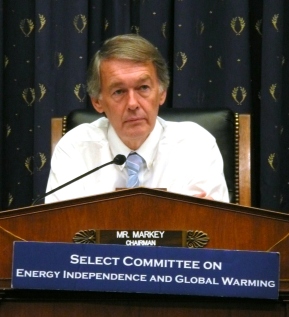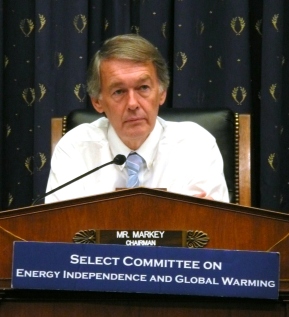 Rep. Ed Markey wants to get to the bottom of the story.Rep. Ed Markey (D-Mass.) wants answers from the pro-coal group that funded the organization responsible for the forged letters sent to House members.
Rep. Ed Markey wants to get to the bottom of the story.Rep. Ed Markey (D-Mass.) wants answers from the pro-coal group that funded the organization responsible for the forged letters sent to House members.
Markey, chair of the Select Committee for Energy Independence and Global Warming, sent a letter to the American Coalition for Clean Coal Electricity (ACCCE) on Wednesday requesting information about its role in the fraudulent letters urging representatives to vote against the House climate and energy bill. ACCCE came forward earlier this week to acknowledge that it had contracted with Hawthorn Group, a consulting firm, which in turn subcontracted with Bonner & Associates, which has admitted that a staffer sent the forged letters.
ACCCE issued a statement on Monday expressing “outrage” over the falsified letters and claiming that it is also a victim in the situation. But as we reported yesterday, documents from ACCCE reveal that it knew about the forged letters two days before lawmakers narrowly approved the climate bill, yet did not make an effort to alert members that they had received the fake letters.
“The deliberate inaction prior to the House vote and the extended silence after the vote — some 40 days after ACCCE knew what had happened — raises serious concerns,” Markey writes in his letter to ACCCE President and CEO Stephen L. Miller.
Markey issued a long list of questions seeking clarification about ACCCE’s role, its relationship to the contracted organizations, and whether any effort was made on its part to rectify the situation once the forgeries were discovered.
Markey also raises questions about the group’s use of astroturfing methods, seeking to determine whether the group used the forged letters “in any broadcast ads, direct mail, ‘push polls,’ online ads, blog posts, email outreach, viral marketing campaigns, ‘street teams,’ or any other new media.” Markey has demanded a response to his letter by August 13.
Here is the full letter:
Dear Mr. Miller:
Recent news reports and other publicly available information indicate that the American Coalition for Clean Coal Electricity (“ACCCE”) was the entity that hired Bonner & Associates to engage in “grasstops” efforts that resulted in fraudulent letters being sent to a number of Members of Congress prior to House consideration of the Waxman-Markey American Clean Energy and Security Act of 2009. I am aware that ACCCE has issued a “Background Document” that seeks to address the matter, but frankly it raises as many questions as it answers. Most glaringly, ACCCE apparently learned of the twelve fraudulent letters on June 24, 2009 (two days before the House vote on the Waxman-Markey bill), but did not take any action to make the affected Congressional offices or the public aware of the situation until some time after ACCCE had known of Bonner & Associates’ actions. Press reports indicate that ACCCE may not have told the other affected offices that they too had received fraudulent letters until Monday, August 3, 2009.
The deliberate inaction prior to the House vote and the extended silence after the vote — some 40 days after ACCCE knew what had happened — raises serious concerns.
In order to enable us to understand the facts and circumstances relating to this matter, I ask you to respond to the following questions:
1. Describe the relationship between ACCCE and Hawthorn Group. How long has ACCCE or its predecessor organizations used the services of the Hawthorn Group? What services do they provide? How much does ACCCE pay Hawthorn Group on a monthly basis? Please provide a copy of all contracts between ACCCE and Hawthorn Group. To the best of your knowledge, is Hawthorn registered under the Lobbying Disclosure Act? 2. The ACCCE background document that you have circulated on Capitol Hill states that ACCCE was aware that the Hawthorn Group had engaged Bonner & Associates to conduct “community outreach.” Where (by Congressional District) was Bonner & Associates hired to conduct this activity? Please provide a copy of all contracts between the Hawthorn Group and Bonner & Associates to perform work for or on behalf of ACCCE. Did the Hawthorn Group engage other “grasstops” or “grassroots” agents to conduct public or community-based outreach? If yes, please identify the other entities that were engaged and the areas (by Congressional District) in which they were hired to conduct “community outreach.”
3. The ACCCE background document also states that “a total of twelve falsified letters were sent by that firm [Bonner & Associates] to the offices of Congresswoman Kathy Dahlkemper, Congressman Christopher Carney and Congressman Tom Perriello.”
a) Please provide a copy of each fraudulent letter sent to these and any other Congressional offices.
b) Explain in detail for each fraudulent letter i) the organization that purported to send the letter, ii) how the organization’s letterhead or logo was obtained and by whom, iii) whether the name as the signatory on the letter was invented or whether that person actually works for such organization, and iv) who forged the signature on the letter.
4. The ACCCE document states that Bonner & Associates’ internal process first identified the twelve fraudulent letters to Members of Congress. How many letters (fraudulent and otherwise) were sent altogether through the efforts of Bonner & Associates or Hawthorn Group on each day in the period between May 1 and June 26, 2009, breaking it down on a daily basis?
5. The letters to Rep. Perriello were from prominent civil rights groups. Did ACCCE ask the Hawthorn Group and/or Bonner & Associates to generate letters concerning the Waxman-Markey bill from civil rights groups? From veterans, religious or business groups? Are the other fraudulent letters to Members of Congress also from similar groups?
6. Were any of the twelve fraudulent letters or the general fact of any of their existence (such as “civil rights groups express concern about legislation”) shared with a) the members of ACCCE, b) the Hawthorn Group, or c) other “grasstops” or “grassroots” advocacy coalition members? Were these letters or the general fact of their existence discussed during any conference calls or on email distribution lists so that these fraudulent letters could have been used to leverage in a misleading way to enlist support from other civil rights or other organizations? Did ACCCE or its member companies or lobbyists make reference to any of the twelve fraudulent letters in meetings with any Member of Congress or their staff? Were these letters or the general fact of their existence provided to other firms or coalition members as part of a coordinated effort?
7. The ACCCE background document plainly states that your organization knew about the twelve fraudulent letters on June 24, 2009, two days before the House vote on Waxman-Markey, but chose to remain silent. When was the office of Reps. Perriello, Dahlkemper and Carney and any other Member who received fraudulent letters first notified that they had been sent fraudulent letters on the Waxman-Markey bill? Who made the contact?
8. The ACCCE background document indicates that ACCCE had decided to leave to others to notify the affected organizations and the Congressional offices of the fraudulent letters. Did ACCCE inform any person when these Members and organizations should be notified? Or when they should not be notified? Did ACCCE indicate that this information should be communicated in a prompt manner, in light of the upcoming vote? Or did ACCCE leave it to others to decide when was the best time to notify the affected Members and these organizations of the fraudulent letters? Did ACCCE make any inquiry whether the targeted Members had been notified of the fraudulent letters prior to the House vote on final passage on the Waxman-Markey bill, which came well after the working day was over on June 26, 2009?
9. Between the time on June 24, when ACCCE first learned of the fraudulent letters, to the time of final passage by the House of the Waxman-Markey bill on June 26, how many calls did ACCCE, acting through itself or the Hawthorn Group or Bonner & Associates or other contractors, arrange or cause or prompt to be made to Members of the U.S. House of Representatives? Did the script for any of these phone bank efforts make reference, either in specific or general terms, to the existence of these fraudulent letters? For the purposes of answering this question, identify any such script if it included any reference to civil rights groups or other group designations that would describe any of the twelve organizations identified on the fraudulent letters. Please supply a copy of any such script.
10. It is evident that ACCCE uses many mechanisms to communicate its views to the public and policymakers. Between June 24 and August 3, 2009, was the fact that these (fraudulent) letters had been sent to Congress used in any broadcast ads, direct mail, “push polls,” online ads, blog posts, email outreach, viral marketing campaigns, “street teams,” or any other new media? If yes, please identify the time and place of each instance and provide a copy or sample of the relevant material.
Given the seriousness of this matter, I hope this matter has your prompt and full attention. Please respond to these questions by August 13, 2009. If you have any questions, please contact Gerard J. Waldron or Michael Goo with the Select Committee staff.
Sincerely,
Edward J. Markey
Chair
UPDATE: Wonk Room reports that Rep. Tom Perriello (D-Va.) also received forged letters purportedly from the Jefferson Area Board for Aging, a Charlottesville senior citizens agency, and the American Association of University Women. Perriello’s office had already confirmed that they recieved a forged letter from Creciendo Junotos, a Hispanic advocacy group, and five letters claiming to be from the local branch of the National Association for the Advancement of Colored People (NAACP). Reps. Kathy Dahlkemper (D-PA) and Chris Carney (D-PA) also received forged letters.


